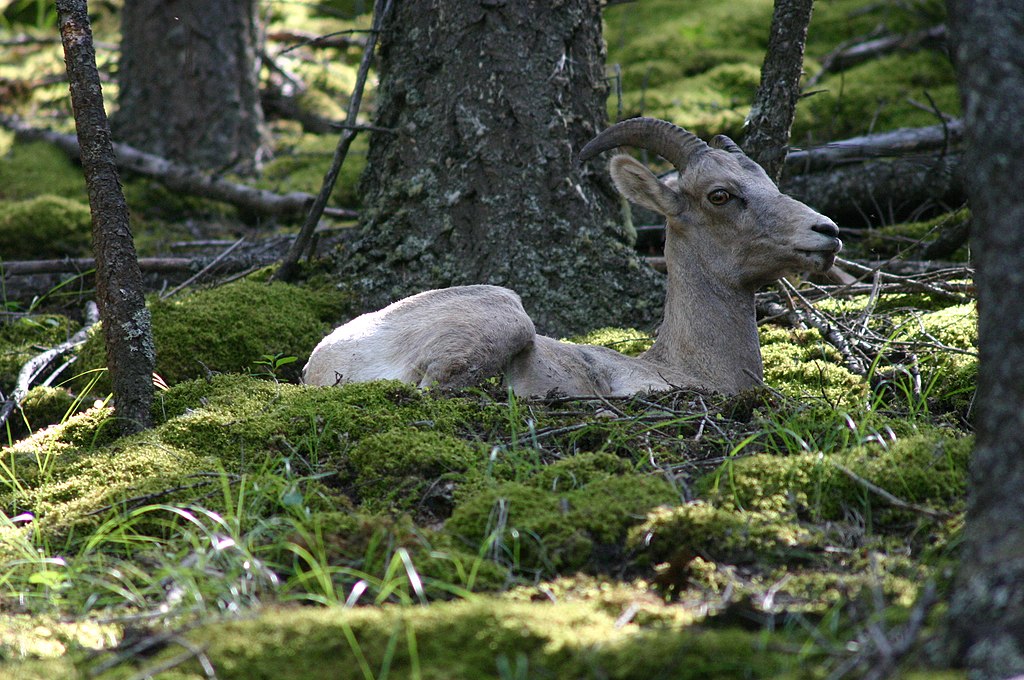
Southern California coastal range in fog: photo by Wing-Chi Poon, 7 November 2007
still traveling further
still, after the tenth year, a spear
planted within
ما زلت
ما زلت يا مسافرة
ما زلت بعد السنة العاشرة
مزروعة...كالرمح في الخاصرة
ما زلت يا مسافرة
ما زلت بعد السنة العاشرة
مزروعة...كالرمح في الخاصرة

Abies lasiocarpa forest encroaching upon a meadow, Mt. Rainier National Park, Washington: photo by Wing-Chi Poon, 12 July 2005

Base of Gorman Falls, Colorado Bend State Park, Bend, Texas: photo by Wing-Chi Poon, 23 April 2005

Three male Tule Elk ( Cervus canadensis subsp. nannodes) standing in heavy fog, along Tomales Point Trail, Point Reyes National Seashore, California: photo by Wing-Chi Poon, 22 November 2008

Bighorn sheep (Ovis canadensis), slightly west of Logan Pass along Going-to-the-Sun Road in Glacier National Park, Montana: photo by Wing-Chi Poon, 16 June 2004

Bighorn sheep, possibly female, resting on forest floor, Kootenay National Park, British Columbia: photo by Wing-Chi Poon, 6 July 2005
Nizar Qabbani (1923-1998): Still (English: TC)
This enigmatic little poem about living with deep sorrow appears to have universal application, though the specific source may be biographical.
ReplyDeleteAnd speaking of biography, as some may be curious:
"Nizar Toufic Qabbani was born in Damascus in 1923 and received his elementary and secondary education in the National Scientific College in Damascus between 1930 and 1941. He entered the Tajhize (Preparatory) school in 1941, and left with the baccalaureate degree in 1942. After three years of studies he graduated from the Syrian University of Damascus in 1945 as a bachelor of law.
"Although Nizar Qabbani is mostly known as a poet, he had a long career in the Syrian diplomatic corps which he joined after university.
"He started composing poetry in 1939 and published his first collection in 1944. This collection was strongly opposed by the conservatives who considered it a deviation from the traditional school of Arabic poetry in form and content.
"Leaving diplomacy in the spring 1966, he devoted himself to a vast production of poetry. His life was also marred by a number of personal tragedies, among them the death of his son Toufic and the disappearance of his wife Balqis under building debris in Beirut.
"His poetry has been translated into many languages and used as popular song lyrics; it continues to enjoy a vast and varied audience.
"Nizar Qabbani passed away in London on May 1, 1998."
Tom,
ReplyDelete"still traveling further/ still. . ."
coastal hills in fog, tule elk in fog, nice to see this on a bright blue day here today. . .
12.2
pink of clouds in sky above still black
ridge, song sparrow calling from branch
in foreground, sound of wave in channel
it follows in comparison to
that, matter equal to
number, variant symmetrical,
which it follows from
sunlight reflected in windblown channel,
white spray above wave breaking into it
I would agree that the poem has universal application. Seeing the Arabic written next to it and the remarkable photographs makes a sadly satisfying picture. You feel that the whole story, such as it can be, is being told to you. I was going to write how surprising I found it that artistic "conservatives" would take strong objection to this work, despite its departure from tradition, but I just read a short biography of Qabbani and can imagine that he stirred up quite a storm. Once again, I find myself surprised by the presence of such a talented man serving as an important diplomat for his country alongside his poetry career. It's not something we Americans are accustomed to. Curtis
ReplyDeleteCurtis,
ReplyDeleteThe historical complications and implications in Qabbani's story are probably well beyond our ken, but suffice to say he was one of a surprising number of great twentieth century writers who served their countries diplomatically. George Seferis, Carlos Fuentes, Octavio Paz... and the list goes on.
I don't think it would be possible for there to be a great American poet right now, in the sense the writers I have just named are great, let alone a great American poet-diplomat.
In historical terms, the relationship between an artist and a culture is necessarily decisive, whether or not this fact is acknowledged by the artists.
(And indeed, it is not hard to see how such acknowledgment could become uncomfortable, in troubled times.)